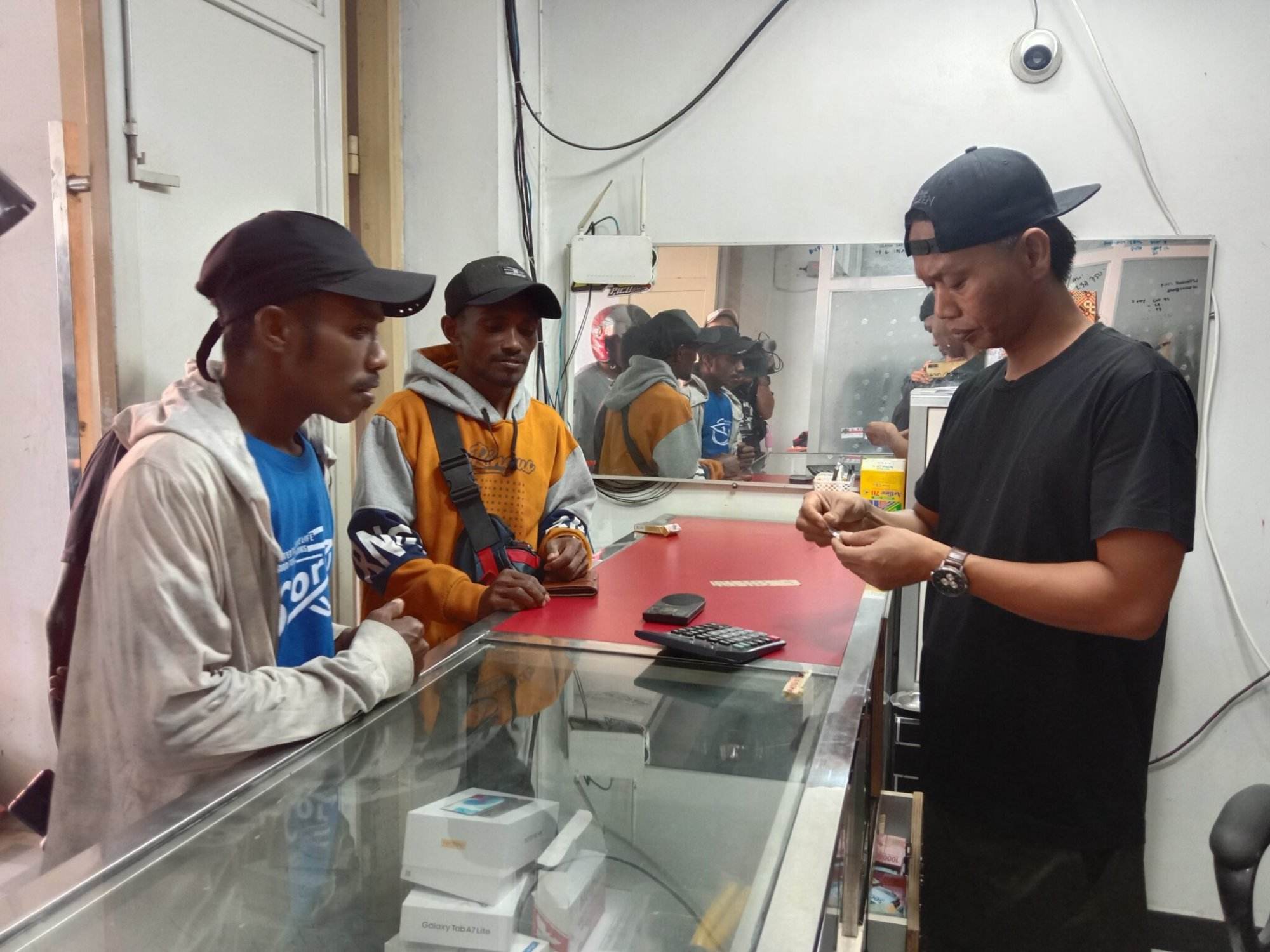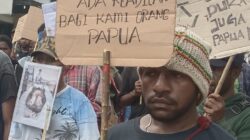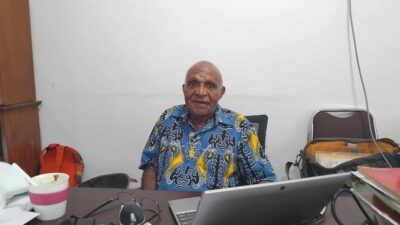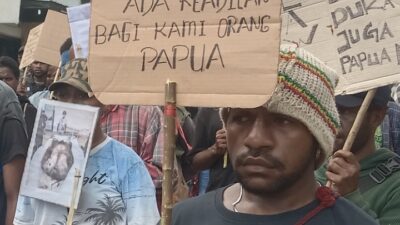Reporter: Theo Kelen, Rabin Yarangga, Dominggus A Mampioper, Angela Flassy
Timika, Jubi – Since 1972, PT Freeport Indonesia’s mining operations in Mimika, Central Papua have transformed mountains into giant ravines, pulverizing mineral-rich rocks and depositing the resulting waste, known as tailings, into rivers. While these tailings have brought fortune to many small-scale miners, they have also led to river and coastal siltation, causing problems in the region. Jubi and CNN Indonesia collaborated to shed light on the dual nature of Freeport’s tailings in a series of three reports. This is the second installment of our collaboration.
The gold shop situated on Jalan Ahmad Yani in Timika, the capital of Mimika Regency, Central Papua Province, has become a bustling hub for gold panners. These panners are eager to sell the gold they have obtained by panning PT Freeport Indonesia’s tailings in Ajkwa River.
Among the crowd, a panner retrieves several small clear plastic bags, typically used for medicine, but now containing grains or powder of gold extracted from Freeport’s tailings. Carefully, he places the plastic packets on the glass table of the gold shop.
The shopkeeper switches on the light and meticulously examines the gold powder under the lamplight. He carefully feels the clear plastic bag to evaluate the purity of the gold grains brought in by the panner.
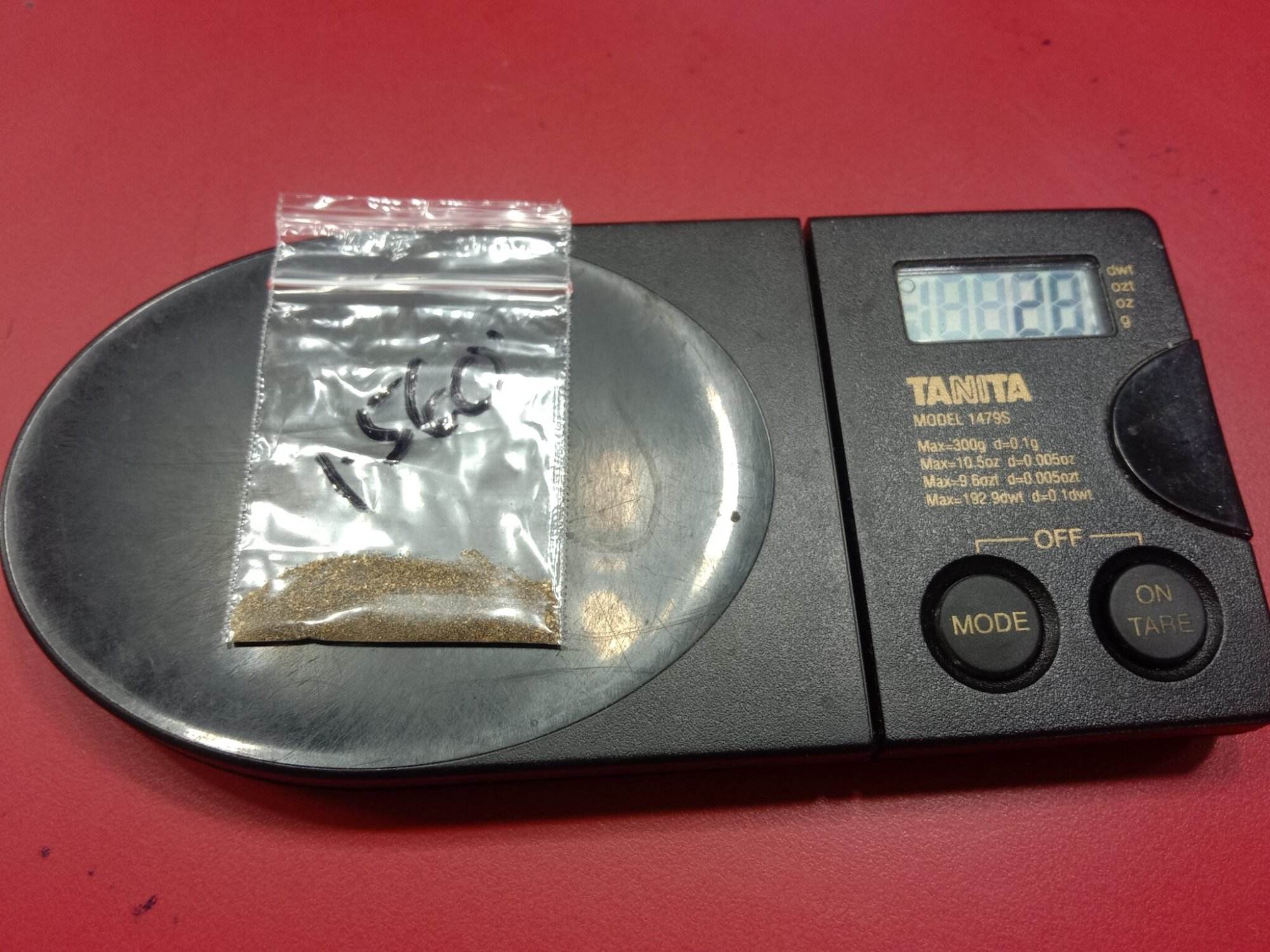
“We need to be attentive because the gold dust contains traces of copper. The closer you get to the upper reaches of the Ajkwa River and the mine, the higher the copper content in the gold dust. On the other hand, downstream of the Ajkwa River, the gold quality improves. However, the quantity of gold is more abundant in the upper areas,” explained Ari, the manager of the gold shop, in an interview with Jubi in February 2023.
Ari typically serves around 50 to 100 gold panners daily. On average, he purchases up to 70 grams of gold per day. “A hundred panners made up to around 70 grams,” he shared.
The value of gold grains brought by the panners is determined by the purity of the gold powder. Gold with high purity fetches a price range of Rp 600,000 to Rp 700,000 per gram. On the other hand, if the panner’s gold powder is considered impure due to excessive sand or rock content, it is valued at Rp 350,000 per gram.
Occasionally, shop owners incur losses due to misjudging the price of gold. “I made a mistake with the purchase of 10 grams. I should have bought it at Rp 500,000 per gram, but I bought it at Rp 650,000. The difference in loss can be significant, while the profit margin, if any, is not substantial,” confessed Ari.
Melting process at the gold shop
To refine the impure gold grains obtained from the panners, a melting process is carried out. Ari takes the recently purchased gold grains to the back of the shop. In a room measuring approximately 3 x 4 square meters, he conducts the melting process for the gold he has acquired.
During this particular instance, Ari melted 10.5 grams of gold powder obtained from the panners. He mixed the 10.5 grams of gold powder with white saltpeter and water. The white powder serves as a cleaning agent for the gold during the smelting process.
The mixture of gold powder and white powder is then placed in a small clay skillet. “The skillet used for melting is special; it must be made of clay. If a metal pan is used, the gold grains may get stuck,” he explained.
Ari ignited a handheld torch powered by gas and operated the compressor. He commenced the process of burning the impure gold powder until it reached a molten state and detached from the rock sand.
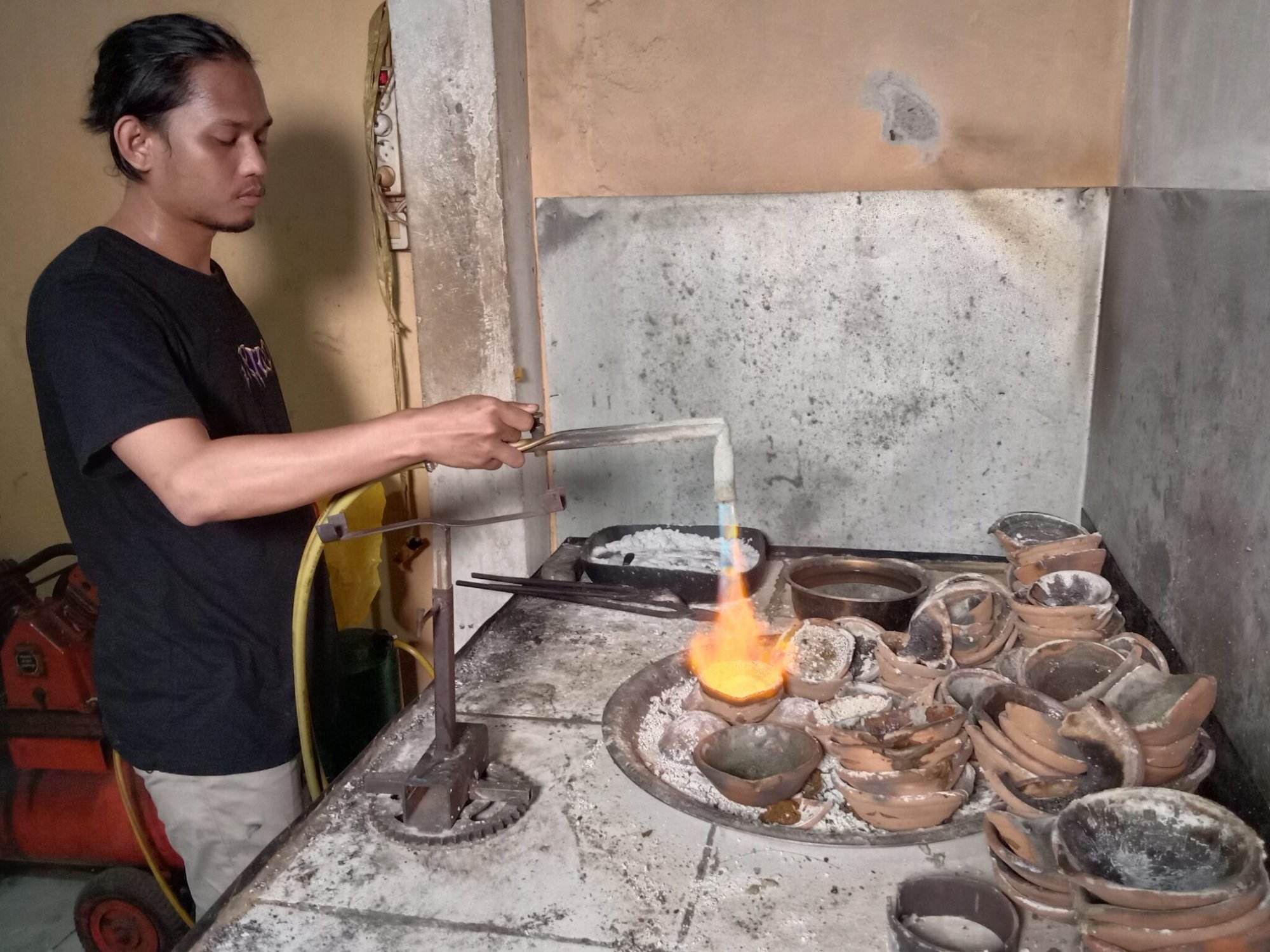
Subsequently, Ari mixed the melted gold with a white powder that acted as an adhesive. He then increased the compressor pressure, intensifying the flames emitted from his handheld burner.
While the burning process continued, Ari carefully separated the liquid gold from the sand and other mineral metals. Gradually, the liquid gold solidified into small gold chunks.
The duration of the gold melting process varies from 10 to 20 minutes, depending on the weight of the gold being melted. “If it appears shiny, that indicates it has fused,” Ari explained as he switched off the torch and compressor.
He allowed the gold lump to cool down before weighing it. The original 10.5 grams of gold powder had been reduced to a small nugget weighing 6.95 grams. This significant reduction in weight highlights the substantial business risk faced by gold shop managers who acquire gold powder from tailings panners.
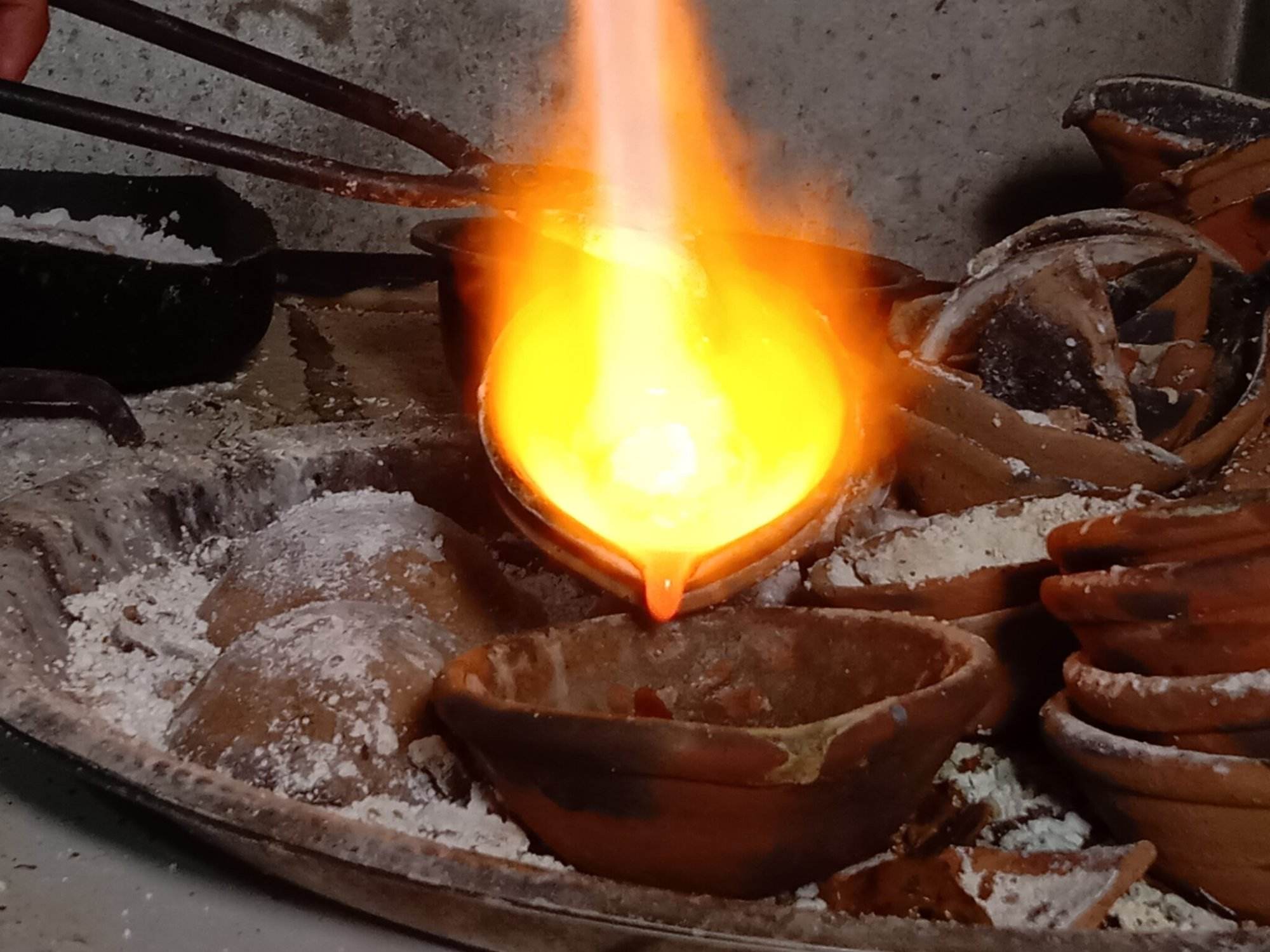
According to Ari, the average purity of the gold dust after melting can reach 92 percent. However, the primary challenge for gold shop owners in Timika lies in accurately assessing the cleanliness and purity of the gold they purchase.
“Determining the gold content requires years of study. It demands expertise,” he emphasized.
Later, the small chunks of gold will be melted again into gold bars. Ari said that the chunks of gold ore must be collected until the total weight reaches approximately 1 kilogram to be melted again into gold bars. The gold bars can later be sold for up to Rp 900,000 per gram.
“It takes one kilogram [of gold ore] to be melted into bars. Surely [the weight] will shrink [after smelting],” Ari said.
Tricky gold trading
According to Muhammad Thahir, engaging in gold trading is not always a straightforward path to profits for gold shops. Thahir emphasized the need for meticulous attention to the gold powder obtained through panning, as it often contains impurities such as copper or brass.
He acknowledged that he had incurred significant financial losses due to purchasing gold mixed with brass. He explained that determining the value of gold based on its purity requires years of experience and precision. He emphasized that all gold powder obtained through panning is typically dirty, and it takes expertise to accurately assess its appropriate price.
Thahir illustrated this by mentioning cases where individuals would sell him 10 grams of seemingly clean gold, and he would estimate its value based on his experience. However, during the processing, the gold powder would shrink by 2 grams, resulting in a final weight of 8 grams. On occasion, he encountered items that he initially estimated at 10 grams but would shrink by half during processing, prompting him to further lower the price.

Therefore, Thahir emphasized that the price of gold is relative and depends on various factors. He clarified that the purchasing price of gold obtained through panning is determined by estimating its purity. The lowest price for such gold is Rp 350,000 per gram, while the highest price ranges from Rp 600,000 to 700,000 per gram.
Thahir explained that his gold shop purchases gold powder from local panners and then proceeds to clean it. The cleaned gold is subsequently sold to larger gold shops or investors. Thahir mentioned that the gold is usually melted down into bars and sold outside of Timika.
He highlighted the lack of goldsmiths in Timika, which is why the gold bars are sold to Makassar to be used in jewelry production. He mentioned that sometimes Timika’s gold shop owners take the gold bars out of Papua, while other times people from outside Timika come to purchase the bars in the area.
“It’s not just people from Timika, sometimes outsiders come to buy gold bars here. The production of decorative items in Timika is still limited,” Thahir explained.
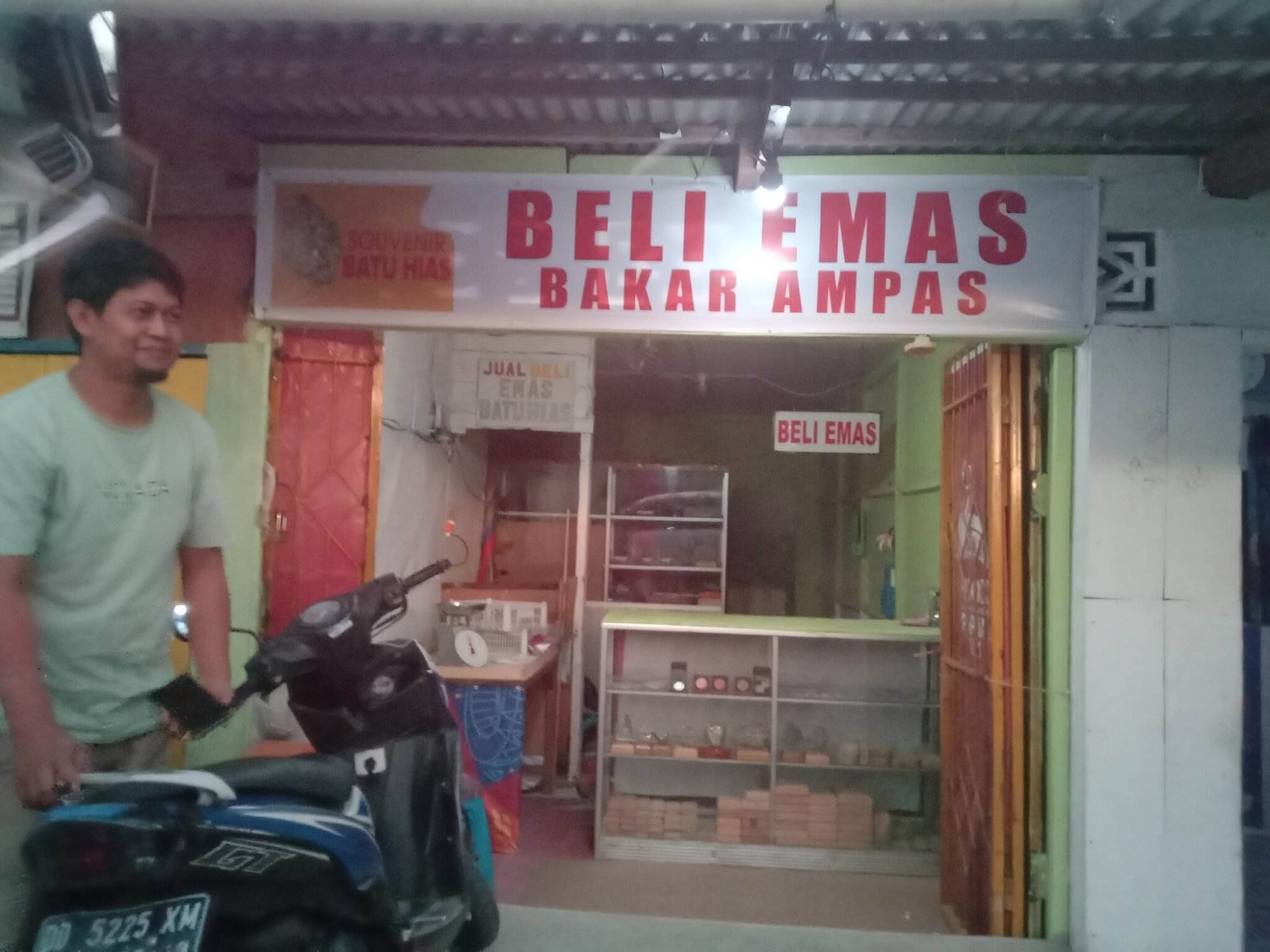
The presence of gold powder shops plays a significant role as they pave the way for panners to sell their findings. Charles, who engaged in panning Freeport’s tailings from 2007 to 2013, experienced firsthand how “gold shops” supported thousands of panners like himself. During that period, Charles was able to obtain approximately 38 grams of gold powder per week, which could be sold for around Rp 120,000 per gram.
In a week, Charles could earn up to Rp 4.7 million. “There was indeed a lot of gold at that time when I was still panning,” he recalled.
Charles, who spent five years as a panner, shared that he was able to achieve significant milestones thanks to the income generated from selling his panned gold to the powder store. With the earnings, he managed to purchase land and construct a house for his family. Additionally, he could afford to provide education for his four children.
“When we were panning, we were able to support our children’s college and school expenses, as well as build a house. Initially, I lived with my family, and then I rented a place for a year. I thought I would never be able to own a house, so I made the decision to buy land and build one using my own money. In 2011, we built the house. And not just that, we also built one in the village using the earnings from panning,” Charles explained on February 2, 2023.
Subsequently, Charles decided to stop panning for tailings from Freeport after securing a position as a civil servant at the Mimika Industry and Trade Office. He acknowledged that, in terms of income, panning was undeniably more lucrative than being a civil servant. However, he took other factors into consideration and recognized that it was not sustainable to rely solely on panning in the long run.
“While panning is certainly profitable, we cannot ignore the fact that we cannot continue doing it indefinitely. There are other considerations. Panning offers good income but it is not a sustainable long-term option,” he stated.
Gold shop owner arrested by police
According to Muhammad Thahir, the majority of gold shops that receive tailings gold possess valid business licenses and fulfill their tax obligations. He further emphasized that there have been no instances of illegal levies imposed on gold shops that acquire gold from Freeport tailings.
“There are no illegal levies. We have never encountered such situations where we had to pay unauthorized fees because we operate with proper licenses and adhere to the regulations in Timika. We have never faced demands for payments. Even if such demands were made, we did not comply,” Thahir asserted.
However, he acknowledged that the gold panning business is not always free from risks and challenges. He explained that several gold shops in Timika had to cease operations due to the arrest of a prominent gold panning entrepreneur by the police in 2018. “Perhaps this case is widely known within Timika,” Thahir mentioned.
The case involved the arrest of the owner of the Rezki Utama Gold Shop in Timika, DA (49), along with the owner of the Bogor Gold Shop, JKF (50), and a Papuan individual named A (45) by the South Sulawesi Police.
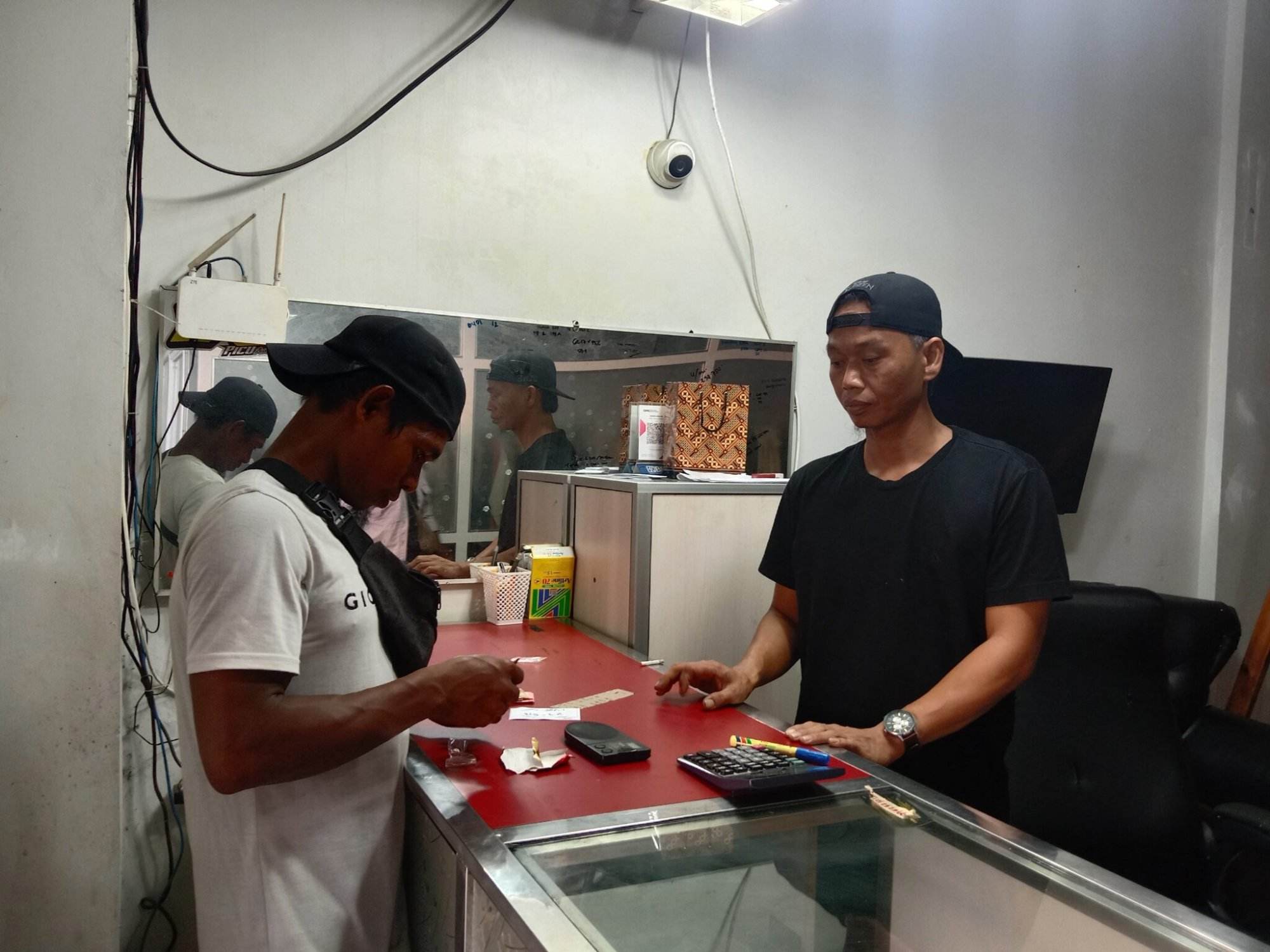
The arrests took place at Sultan Hasanudin International Airport in Maros, South Sulawesi when the people were found carrying 10 kilograms of gold bars from Timika. These gold bars were deemed illegal by the police in Makassar.
Thahir explained that this case had significant repercussions, leading many gold shops to cease purchasing gold from panners. One of the primary reasons for the closure of these shops was their inability to access the necessary capital to buy gold from panners. Thahir mentioned that the shop owners who were arrested used to provide capital to smaller gold shops so they could purchase gold powder from panners.
“The people involved in the case were the one who provided the capital. This means that the funds we used to buy gold are no longer available. Consequently, we experienced a shortage of cash. It was an extremely challenging situation because we lacked the necessary funds. People wanted to sell their gold, but we were no longer able to buy it,” Thahir explained.
The legal proceedings in Makassar disrupted the financial flow for many individuals in Timika. It wasn’t just the panners or gold shop owners who were affected; the legal case in Makassar also had adverse effects on other goods and service providers in Timika, causing a significant decline in their turnover.
“If it weren’t for the panners, there would be no economy to support the Timika community. You can verify this by asking the shops in the market about the impact if the panning activities were halted,” said Thahir.
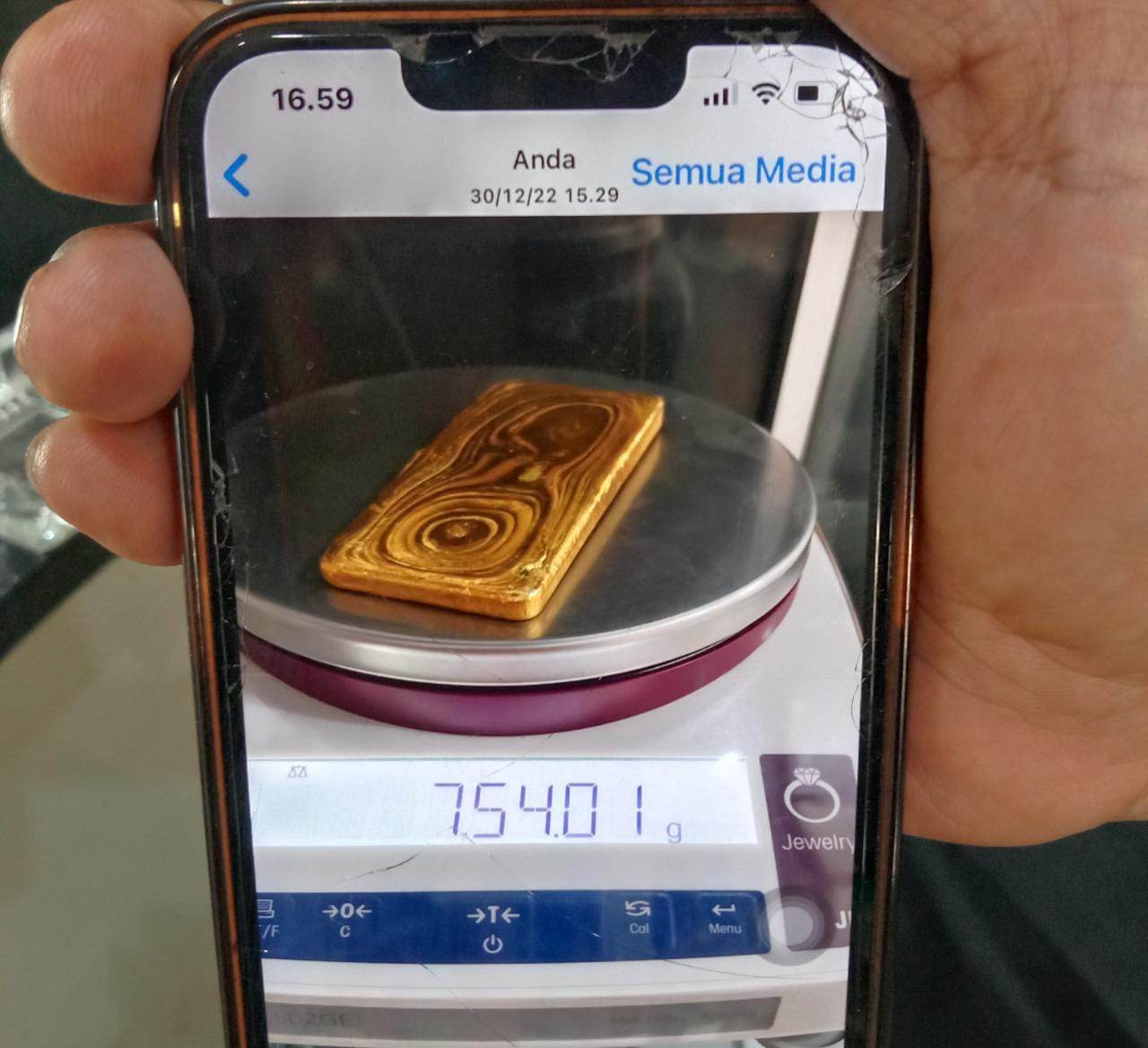
Amidst the challenging situation, Thahir devised a solution by collaborating with a pawnshop. He would purchase gold dust from the panners with the funds he had, process it, and then pawn the resulting gold nuggets to the pawnshop. However, Thahir’s purchasing capacity for gold dust fell far short of the volume supplied by the panners.
A week after the closure of the “gold shops,” the panners organized a large-scale demonstration, demanding that the shops reopen as they were encountering difficulties in selling the gold they had panned.
“It was a chaotic period. The local people were solely concerned with selling their gold without considering the source of funds. We had a financier who was involved in a legal case. Consequently, incidents of arson and vandalism escalated. However, the police and army promptly intervened to suppress the situation,” Thahir recalled.
The tension gradually eased when the Mimika People’s Council (DPRD) intervened to bring together all the stakeholders. During the meeting with the Mimika DPRD, Thahir discussed the state of his business, emphasizing the dependency of “gold shop” owners on pawnshops for capital.
“I conveyed during the meeting with the Mimika DPRD that our source of funds for purchasing gold dust from the panners was limited to pawning only. I presented receipts from the pawnshop as evidence. Fortunately, at that time, the pawnshop was willing to assist and help mitigate the potential for further turmoil,” Thahir shared.
One of the panners named Edo vividly recalls the desperate situation he faced when the gold shop closed down in 2018. He also remembers participating in protests alongside fellow panners, demanding the reopening of the shop. “We demonstrated at the Mimika DPRD until the gold shop was reopened,” he recalled.
Edo acknowledged that the amount of gold he can extract now is significantly less compared to 2018. In the past, he could earn around 15 to 20 grams of gold per week, but now he only manages to obtain one gram of gold every three days.
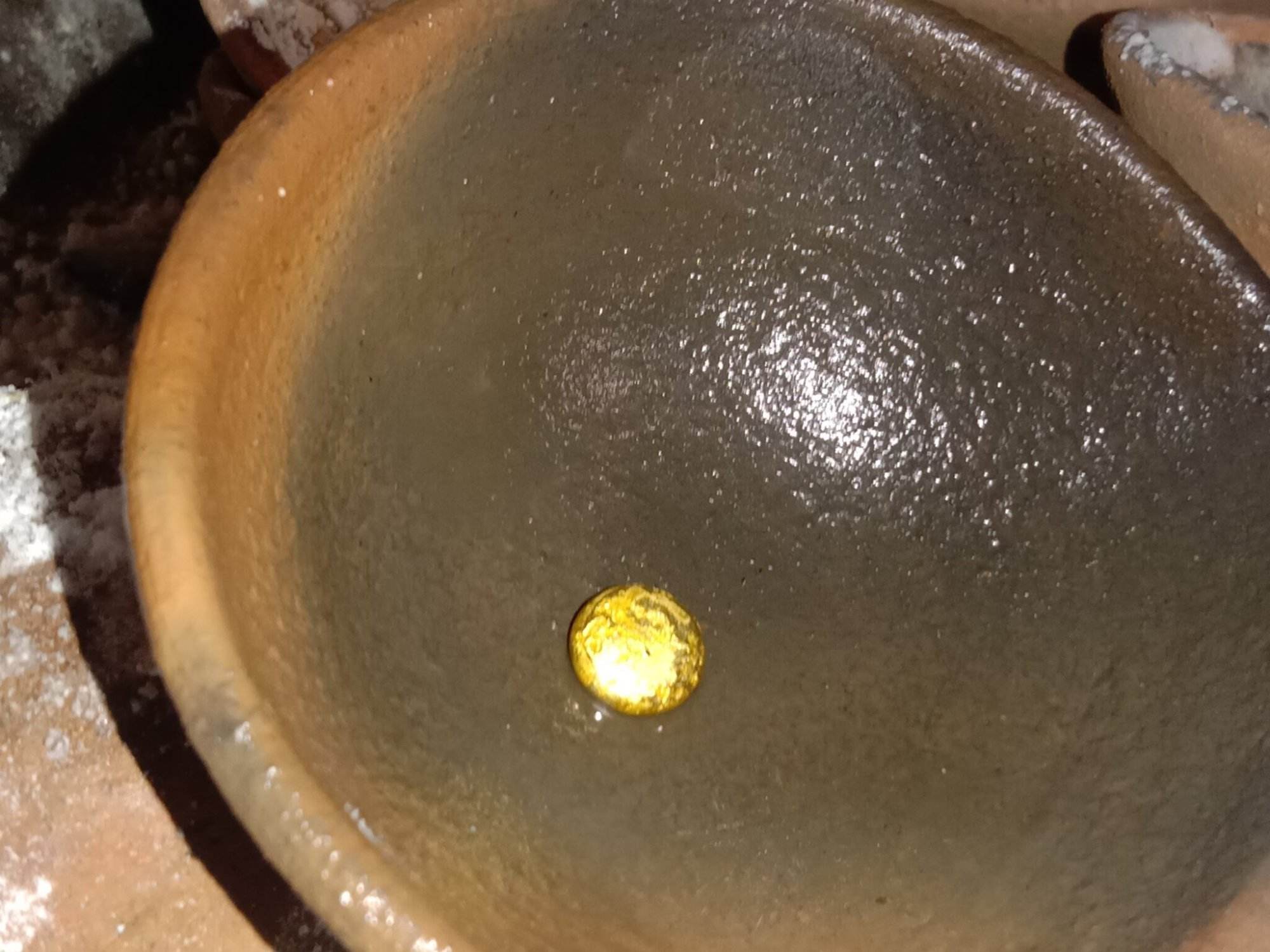
Despite the decrease in gold yield, Edo continues to choose panning as his means of income because he has attempted to secure other jobs but has not been successful.
Having been involved in panning for four years, Edo hopes that the gold shop will continue to operate and purchase the gold extracted by the panners. “We migrate for the sake of our families. The presence of the gold shop truly helps us,” Edo expressed.
Although the legal case in Makassar, South Sulawesi, has caused significant social unrest by disrupting the financial flow of numerous parties, Rafael L Toruan, an Associate Researcher at the Central Statistics Agency of Mimika Regency, stated that the contribution of the gold panning business to the economy of Mimika Regency is relatively small.
According to Rafael, the money circulated by the panners only contributes around 0.2 to 0.3 percent to the economy of Timika. Rafael mentioned that the income from panning ranges from Rp 500,000 to Rp 1,000,000 per day. The monetary circulation and economic impact resulting from the panning business in Mimika amount to only around Rp 2 to Rp 3 billion annually.
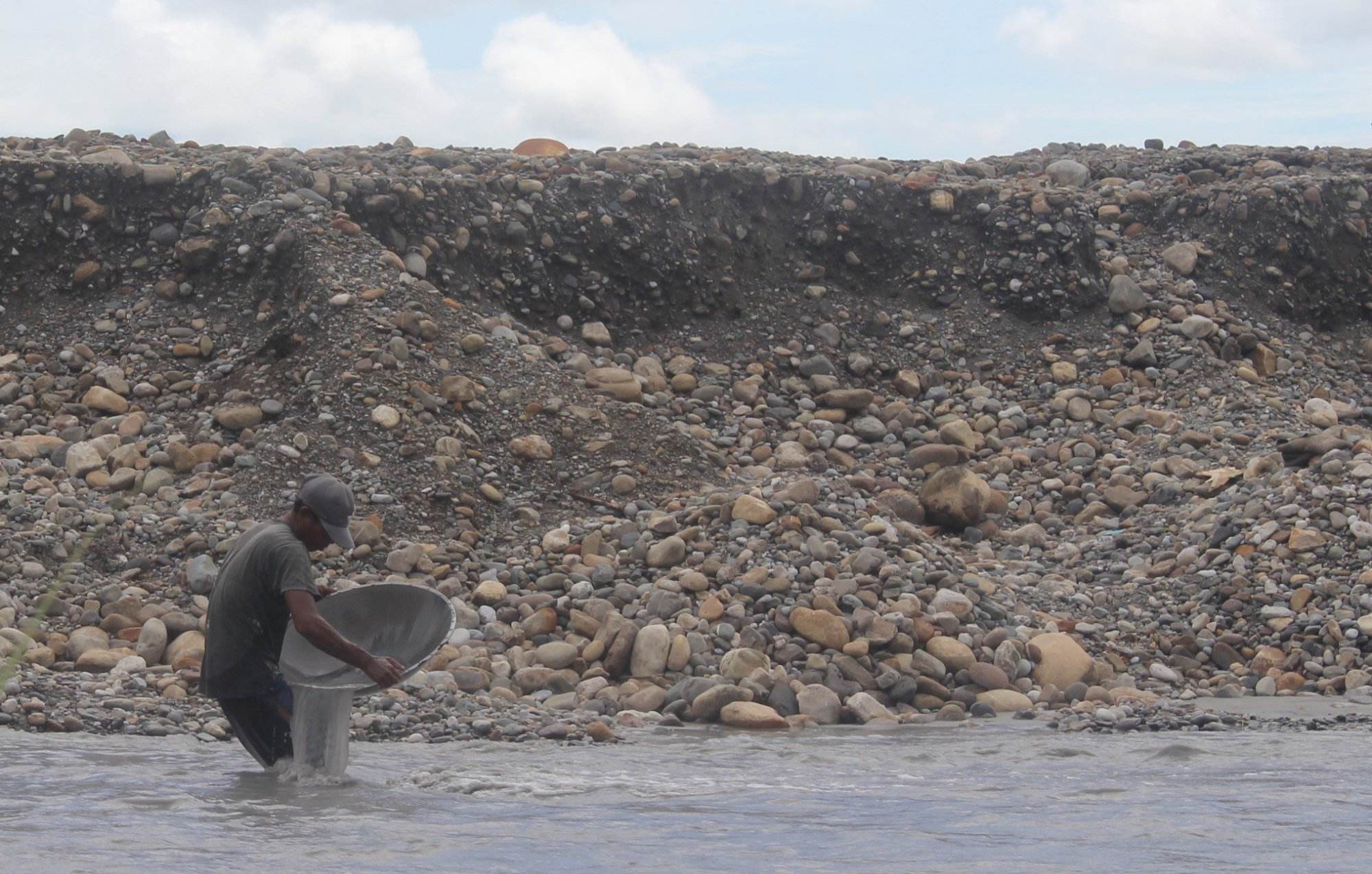
“Therefore, the contribution is not significant, as the panning business is not a permanent field in Mimika,” Rafael explained on January 27, 2023.
Rafael acknowledged the presence of numerous panning activities carried out by residents in Mimika. However, he emphasized that panning is not the primary source of livelihood for the local population. According to Rafael, panning serves as a side job.
“If we consider it as a foundation, not everyone can rely on it, as there are panners who have other occupations such as farming or raising livestock in their villages. They turn to panning when they experience a lack of income. In recent years, there has been a prohibition on panning in some areas. Consequently, the panning activities have dramatically decreased by up to 50 percent compared to the past,” he elaborated.
Panning is significant: panners disagree
The assertion that the tailings panning has an insignificant impact on the local economy of Timika is challenged by Simon Rahajaan. He holds a different viewpoint, stating that panning activities have contributed to the economic growth of Timika, considering the significant number of panners, which exceeds 4,000 individuals.
Rahajaan highlighted that these thousands of panners come from diverse tribes, including Manggarai, East Flores, Bugis, Makassar, Toraja, Manado, Buton, Maluku, Java, and Indigenous Papuans.
“They venture into this field with the hope of being able to provide for their children and wives,” Rahajaan said.
According to him, during the one-week closure of the gold shop following the legal case in Makassar in 2018, the value of transactions involving gold powder in the first three days alone reached Rp 13 billion.
“And that is with limitations because each panner who possesses 5 grams of gold powder can only sell 2.5 grams, allowing other panners to also sell their results,” Rahajaan added.
Rahajaan strongly believes that gold panners make a substantial contribution to the economic growth of Mimika Regency. He illustrated this by explaining the daily activities of a panner: commuting to the market, purchasing food, selling their gold at the shop, buying groceries for their families, and repeating the cycle the next day. According to Rahajaan, this circulation of money stimulates the economy, and the impact is significant.
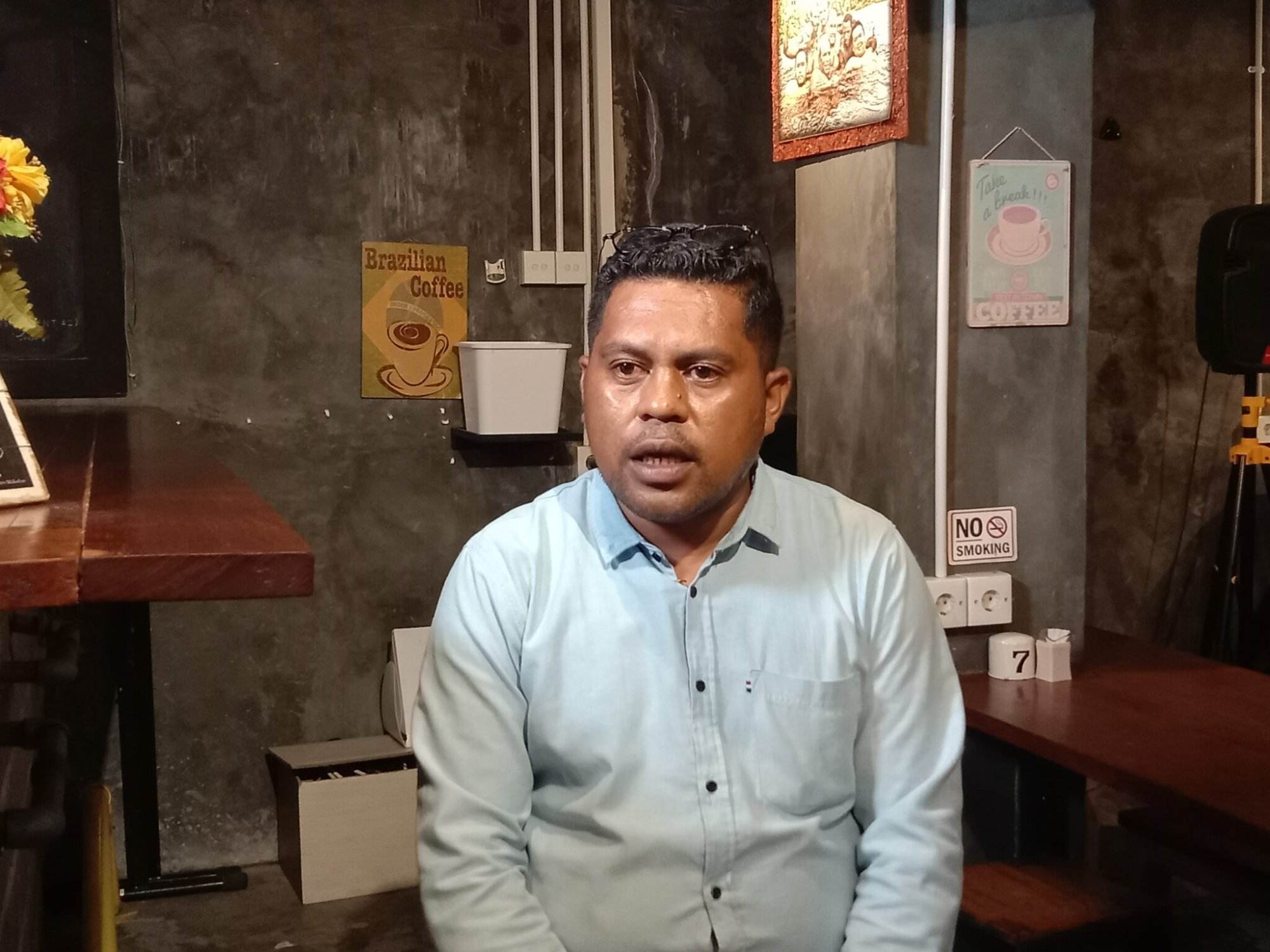
He provided examples to support his claims, such as a church called GPI that was primarily funded by panners, with 85 percent of the construction costs covered by the proceeds from panning.
Additionally, he mentioned that panners were able to send their children to college, build luxurious houses, purchase cars, and establish boarding houses using the income derived from their panning activities. Rahajaan highlighted these positive impacts as outcomes of panning.
Mimika DPRD lawmaker Elminus Balinon Mom also expressed the view that gold panning plays a crucial role in driving the economy of the Mimika community. He highlighted that thousands of people in Mimika rely on Freeport tailings as their source of livelihood.
“The economic benefits for the community are extraordinary. People from not only Mimika but all over Indonesia come here for tailings panning. Those who face difficulties in making a living, supporting their children, and even those who want to build churches or mosques, all turn to panning,” Mom stated on January 27, 2023.
Mom explained that initially, the Mimika Administration, Mimika DPRD, PT Freeport Indonesia, and the church had agreed to ban Freeport tailings panning due to concerns about the safety and health of the panners.
“We prohibited them from entering the work areas due to the hazardous waste. The tailings contain toxins, and we didn’t want the community to suffer harm or be affected during floods,” he explained.
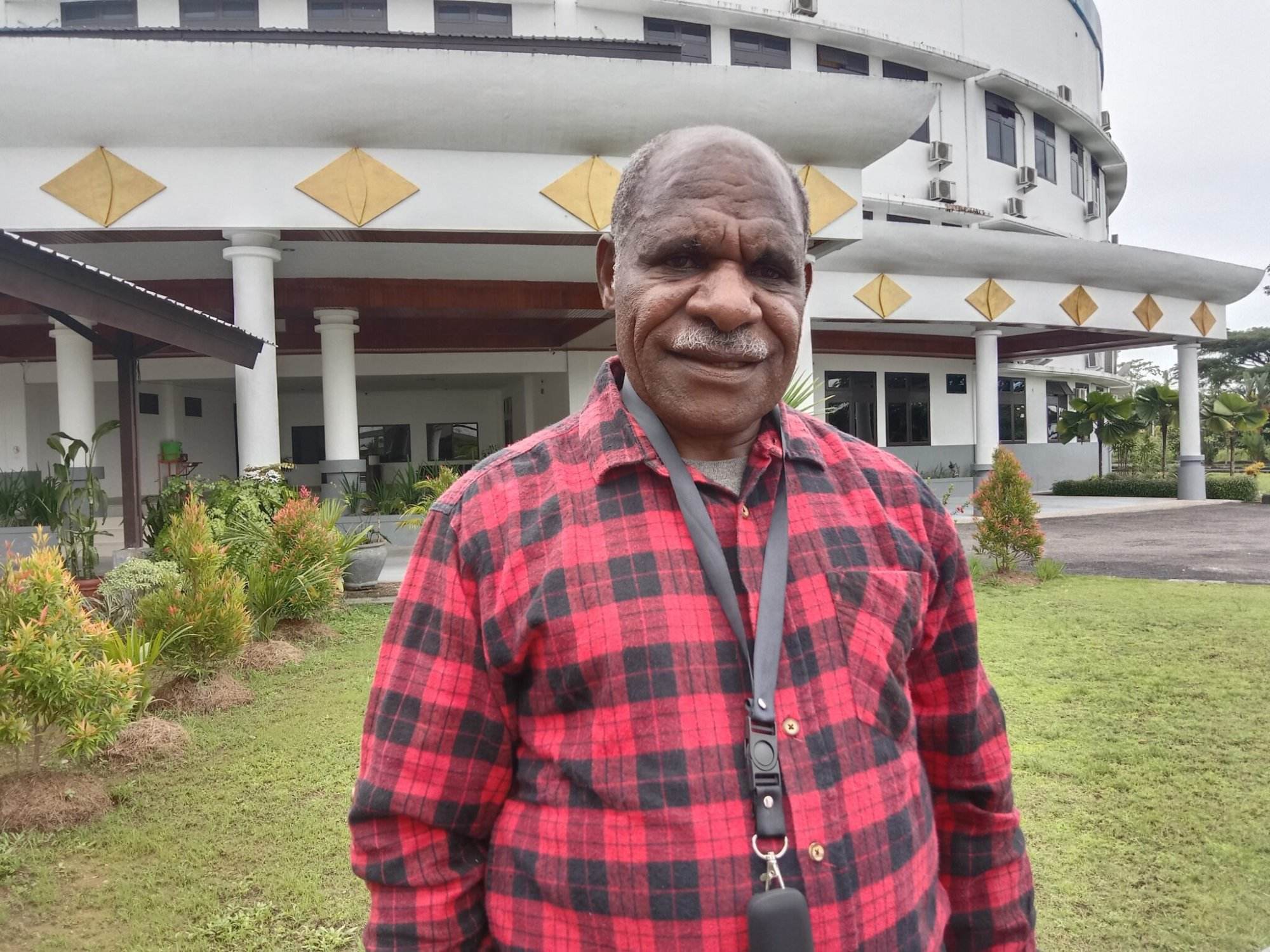
However, Mom mentioned that now all parties no longer enforce the prohibition. This change in stance is attributed to the recognition that the activity drives the local economy and helps reduce unemployment in Mimika.
Mom also emphasized that the operations of the gold shop are entirely legal. He clarified that the shop possesses a valid business license and rejected the notion that gold panning transactions were illegal.
“The sale of gold from panning is legal. All the necessary licenses are in place. People bring their gold to this shop with proper documentation. It is not illegal; it is completely legal. When people claim it’s illegal, it’s a false accusation,” stated Mom.
He highlighted that if panning activities were to be banned, it would have severe repercussions on the security and stability of Timika. Thousands of individuals depend on panning as their source of livelihood, and a ban would result in increased unemployment and various social problems.
“Many people’s daily lives depend on panning. If it is prohibited, unemployment will soar, and problems will resurface. Who will take responsibility for that?” he questioned.
For gold shop entrepreneurs like Muhammad Thahir, having legal certainty is of utmost importance in conducting their businesses. They acknowledge that they play a crucial role in supporting the livelihoods of the panners but are constantly concerned about facing legal issues.
Thahir expressed his hope that the Mimika Administration and the Mimika DPRD can establish a legal framework that safeguards the interests of the panners and the gold shop owners who purchase panning gold. (*)


